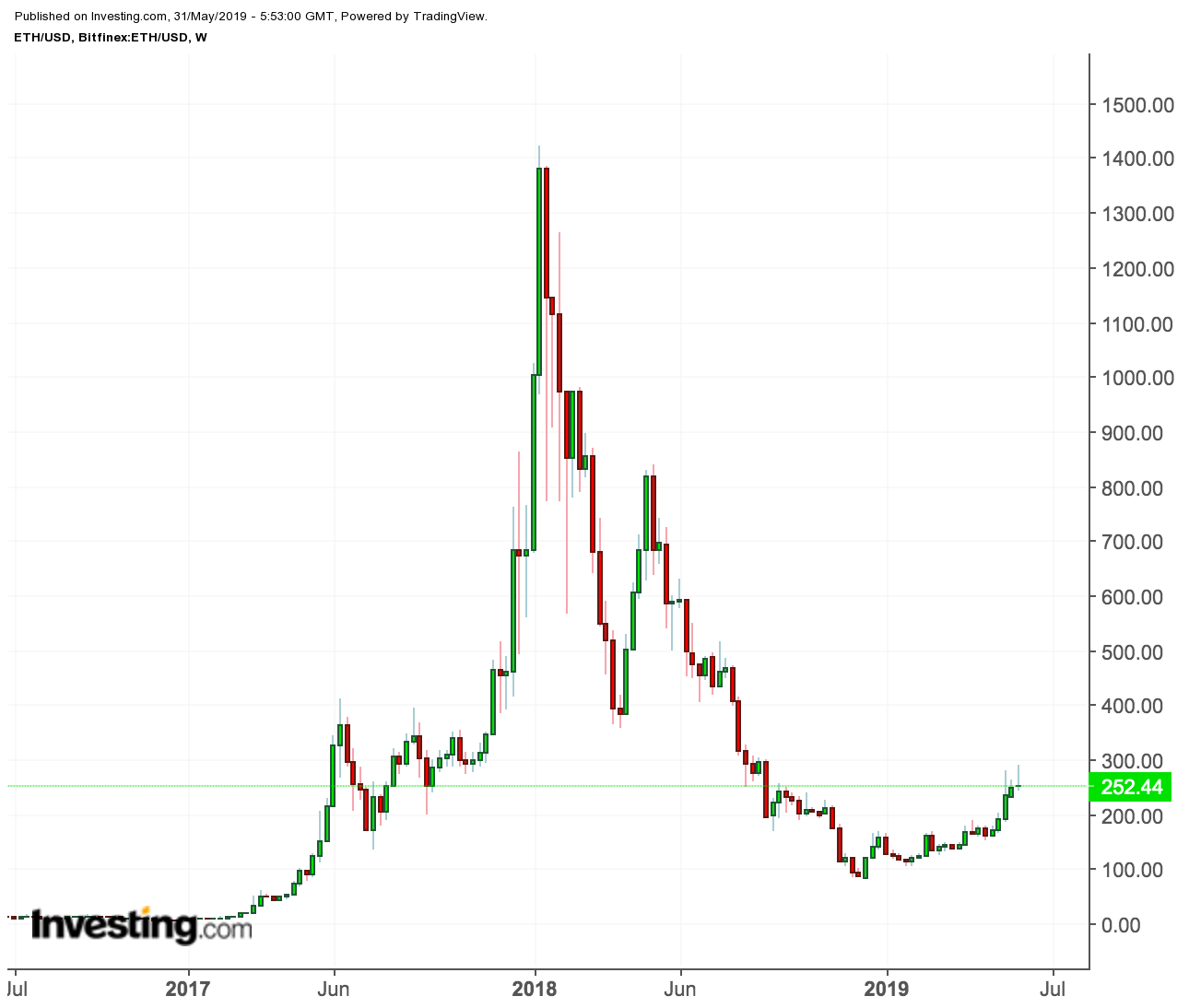Grayscale Investments confirmed last week that it has gained approval from the U.S.'s Financial Industry Regulatory Authority (FINRA) for its Ethereum Trust to begin trading via over-the-counter (OTC) markets in early June. The fund, which was established in 2017 has, up until now, only been available to accredited and institutional investors for private transactions of $25,000 or higher.
When it launches on the OTC, retail investors will also be able to gain exposure to the fund, which will trade under the ticker ETHE. Grayscale is touting the product as "the first U.S. publicly quoted security solely invested in and deriving value from the price of Ethereum."
Endorsing Cryptocurrency's Validity
Many are viewing this latest FINRA approval of another cryptocurrency investment vehicle as reinforcing the validity of the asset class. It doesn't hurt, of course, that the timing for this launch nicely coincides with the general uptick in the crypto market after the rapid and precipitous declines seen at the end of 2017 and into 2018.
Over the past week, Ethereum, the second most popular digital currency by market cap, had gained 18.33%, before dropping 11.4% in yesterday's session.

There are, however, a fair number of people who believe derivative instruments focusing on cryptocurrencies are at best a less effective way of gaining exposure to digital assets. Matthew Finestone, director of business development at Loopring, an open-source protocol for exchanges, is critical of this latest launch:
"While that's a big positive, I personally view these trusts as somewhat counter to the ideals of Ethereum, Bitcoin, and cryptocurrencies in general. I want to hold the base asset itself, and I want it to be secured by the network itself - not a trust.”
Finestone also questions the intelligence of paying management fees when you buy the asset directly with no additional costs. Grayscale's ETHE charges a 2.5% annual fee per share, which represents approximately 0.09662399 ETH. In Firestone's view, it's bad enough not owning the crypto directly, but:
“Certainly not a trust that charges me a few percent a year, and most importantly, that trades significantly over NAV. If GBTC (Grayscale Investments) is any indication of the premium that ETHE will trade at relative to actual Ether, you can expect retail traders to pay ~20-40% above market value to gain this exposure. That's a bit unsettling,”
Nonetheless, there's an argument to be made that the potential safety gained by investing in a managed fund might be worth the extra cost. Iain Wilson, advisor to NEM Ventures, the venture capital and investments arm of the NEM blockchain, notes:
"Whilst the annual fees associated with this trust may seem high, the ability to park small amounts of cash, as part of a diversified retirement portfolio, will be the main driver of demand from retail investors."
Wilson also notes that the trust could have unexpected, knock-on benefits for the the digital currency's developers.
"For the Ethereum platform, having long-term, passive, real money holders will allow its projects to more easily fund themselves through the liquidation of ETH holdings."
Bitcoin ETF Next?
Of course, any time a new crypto-specific derivative receives regulatory clearance, the next question is always: when will the U.S. approve a Bitcoin exchange traded fund (ETF)? There have been numerous applications over the past few years, all of which were rejected by the Securities and Exchange Commission (SEC).
“The timeless question of 'when ETF?' may resolve itself in a positive way towards the end of 2019 or early 2020," says Finestone.
"As far as I know, regulators have a problem with the immaturity of crypto exchanges, and the susceptibility to manipulation that allows. An ETF would look to several of these exchanges to mark prices, prevent flash crashes, etc.
However, we are starting to see some serious research put forth that while the long tail of crypto exchanges may be faking volumes, trade prints, etc., the large regulated ones are professionalizing at a rapid pace. The Bitcoin market in particular is deep and liquid to be able to support an ETF, in my opinion.”
"We're slowly moving in that direction," concurs Kirill Bensonoff, CEO of OpenLTV. He believes it could happen as early as 2020.
“This fund [Grayscale ETH] is trading over the counter in the U.S. so we have not yet reached a point when a crypto-asset or an instrument that represents a crypto-asset is trading on a major U.S. exchange. [Though in future] I believe we are looking at a few possible scenarios—ETF approval or listing of a derivative instrument. For an ETF to be approved, the SEC is looking for more market maturity.”
Ethereum's Istanbul Hard Fork on the Horizon
As for Ethereum itself, there's a system-wide upgrade or hard fork, dubbed Istanbul, expected to go live during October, 2019. Says Emma Cui, CEO of LongHash, a global blockchain incubator, that it could provide an additional boost to the digital currency:
“Currently, there is no accepted proposal suggesting any major changes to the consensus mechanism or the underlying architecture of Ethereum, meaning ETH’s Istanbul will only improve the use experience instead of changing the technology fundamentally.
So far, the one proposal that has been approved, suggests a small change in the Gas fee of Ethereum’s network, leading me to believe that this creates a more technically-streamlined ETH rather than creating an entirely new offspring.”
